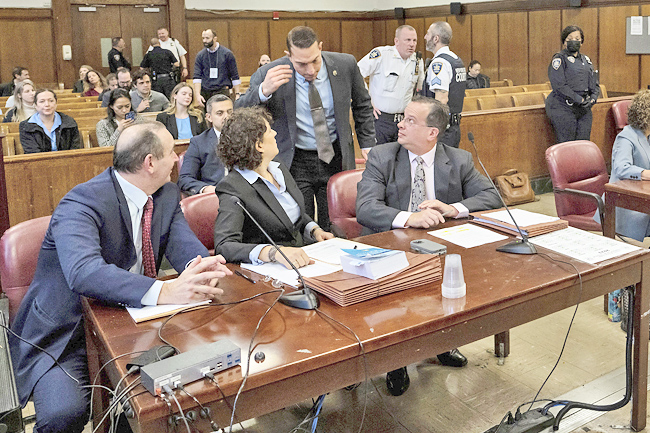NEW YORK (AP) – Donald Trump’s company was fined USD1.6 million on Friday for a scheme in which the former president’s top executives dodged personal income taxes on lavish job perks – a symbolic, hardly crippling blow for an enterprise boasting billions of dollars in assets.
A fine was the only penalty a judge could impose on the Trump Organization after its conviction last month for 17 tax crimes, including conspiracy and falsifying business records.
The amount was the maximum allowed by law. Judge Juan Manuel Merchan gave the company 14 days to pay. A person convicted of the same crimes would’ve faced years in prison.
Trump himself was not on trial and denied any knowledge that a small group of executives were evading taxes on extras including rent-free apartments, luxury cars and private school tuition.
Prosecutors said such items were part of what they dubbed the Trump Organization’s “deluxe executive compensation package”.
The company denied wrongdoing and said it would appeal.
“These politically motivated prosecutors will stop at nothing to get former president Trump and continue the never ending witch-hunt which began the day he announced his presidency,” the company said in a statement after the fine was announced.
Neither the former president nor his children, who helped run the Trump Organization, were in the courtroom.

While the fines – less than the cost of a Trump Tower apartment – aren’t big enough to impact the company’s operations or future, the conviction is a black mark on the Republican’s reputation as a savvy businessman as he mounts a campaign to regain the White House. Outside the courtroom, Manhattan District Attorney Alvin Bragg, a Democrat, said he wished the law had allowed for a more serious penalty.
Besides the company, only one executive was charged in the case: former Trump Organization Chief Financial Officer Allen Weisselberg, who pleaded guilty last summer to evading taxes on USD1.7 million in compensation.
He was sentenced on Tuesday to five months in jail.
The criminal case involved financial practices and pay arrangements that the company halted when Trump was elected president in 2016.
Over his years as the company’s chief moneyman, Weisselberg received a rent-free apartment in a Trump-branded building in Manhattan with a view of the Hudson River. He and his wife drove Mercedes-Benz cars, leased by company. When his grandchildren went to an exclusive private school, Trump paid their tuition. A handful of other executives received similar perks.
When called to testify against the Trump Organization at trial, Weisselberg said that he didn’t pay taxes on that compensation, and that he and a company vice president conspired to hide the perks by having the company issue falsified W-2 forms.
Assistant District Attorney Joshua Steinglass told jurors Trump had a role, showing them a lease that the Republican signed himself for Weisselberg’s apartment.
“Trump is explicitly sanctioning tax fraud,” Steinglass argued.
Weisselberg also attempted to take responsibility on the witness stand, saying nobody in the Trump family knew what he was doing.
He choked up as he told jurors, “It was my own personal greed that led to this.”
At the trial, Trump Organization lawyers repeated the mantra, “Weisselberg did it for Weisselberg.” In its statement on Friday, the company took a different tone.
“Allen Weisselberg is a victim,” it said. “He was threatened, intimidated and terroried. He was given a choice of pleading guilty and serving 90 days in prison or serving the rest of his life in jail – all of this over a corporate car and standard employee benefits.”
A jury convicted the company of tax fraud on December 6.
The Trump Organization was charged through two corporate entities: The Trump Corporation, which was fined USD810,000; and Trump Payroll Corporation, which was fined USD800,000.



















































